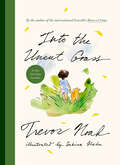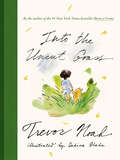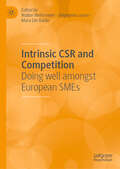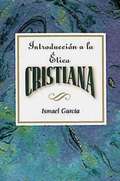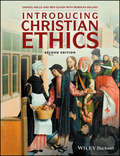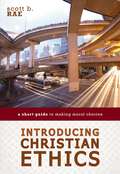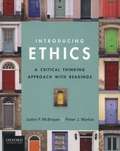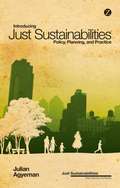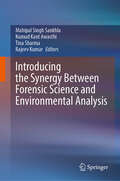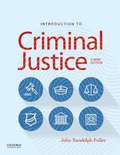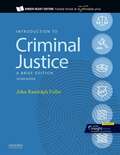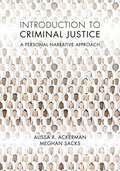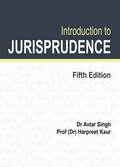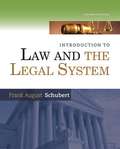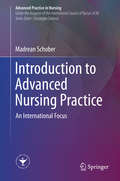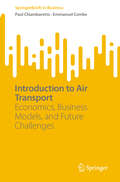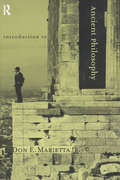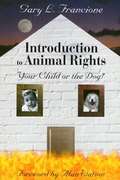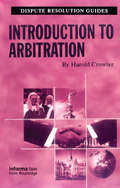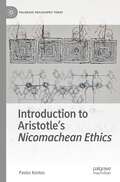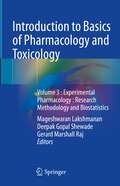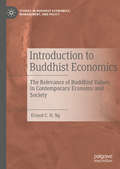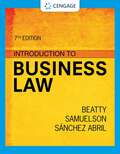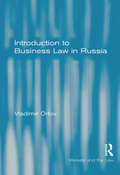- Table View
- List View
Into the Uncut Grass
by Trevor NoahFrom the #1 New York Times bestselling author of Born a Crime comes a timeless illustrated story inviting people of all ages to connect with one another in a world brought to life with imagination. &“But sooner or later your mother will find us,&” Walter said, looking back at the house. &“She always does.&”The boy&’s eyes lit up again. He had an idea.&“Then this time we need to go where we&’ve never gone before,&” he said. &“Into the uncut grass!&” In the tradition of The Boy, the Mole, the Fox and the Horse comes a gorgeously illustrated fable about a young child&’s journey into the world beyond the shadow of home, a magical landscape where he discovers the secrets of sharing, connection, and finding peace with the people we love. Infused with the author&’s signature wit and imagination, in collaboration with visionary artist Sabina Hahn, it&’s a tale for readers of all ages—to be read aloud or read alone.
Into the Uncut Grass
by Trevor NoahA story for all ages from the author of the #1 bestselling Born a Crime &“What will we find in the uncut grass?&”&“It depends on what we&’re looking for.&”In the tradition of The Boy, the Mole, the Fox and the Horse comes a gorgeously illustrated fable about a young child&’s journey into the world beyond the shadow of home, a magical landscape where he discovers the secrets of solidarity, connection, and finding peace with the people we love. Infused with the author&’s signature wit and imagination, in collaboration with masterful artist Sabina Hahn, it&’s a tale for readers of all ages—to be read aloud or read alone.
Intolerancia absoluta
by Kenneth Eade Alejandra GutiérrezLa homofobia se vuelve mortal cuando un asesino en serie ataca en esta excelente nueva novela de suspenso legal. El abogado Brent Marks aboga por un caso de matrimonio de una pareja gay. Luego de obtener la victoria, la pareja es encontrada brutalmente asesinada pasando a convertirse en las primeras víctimas de un infame asesino en serie, cuyos blancos son parejas homosexuales. Toda la evidencia apunta a un fanático religioso que ha hablado abiertamente en contra del matrimonio gay y que le pide a Brent que lo defienda. ¿Podrá Brent resolverse a defender al único sospechoso del caso a quien la policía considera responsable? En un terreno donde la ética y la tolerancia chocan, Brent deberá resolver los asesinatos para armar una defensa viable, lo que lo llevará a él y a su equipo directamente a la senda del asesino. Elogios de la crítica “Kenneth Eade es uno de nuestros escritores de thrillers más sólidos y el hecho de que extrae sus historias del panorama filosófico contemporáneo es un gran mérito suyo”. Grady Harp, Amazon Hall of Fame, Top 100 y Vine Voice. “Intolerancia absoluta está llena de emocionantes giros inesperados, pero su verdadera sorpresa reside en la inesperada conclusión que resume con esmero los eventos sin tomar un camino predecible. Esto la convierte en una joya para los lectores de misterios y dramas legales acostumbrados a pistas que llevan a una sola dirección. Sin dar más detalles, baste decir que Intolerancia absoluta da que pensar de principio a fin y es una historia irresistible impulsada por asuntos sobre la religión y las libertades civiles de los gais”. Midwest Book Review.
Intrinsic CSR and Competition: Doing well amongst European SMEs
by Mara Del Baldo Walter Wehrmeyer Stéphanie LooserThis edited book is at the intersection of the discussion on family-owned business, the CSR agenda and company competition in Europe. The authors contribute to the debates on corporate social responsibility by arguing that formal management systems are not the one-size-fits-all solution they are typically presented to be. Exploring alternative interpretations of the profile environmental management activities have in SMEs, the book evaluates the way in which cultural and ethical values are embedded in European SMEs in order to drive and orientate CSR successfully without following the mainstream ‘systems’ approach. It addresses several values of thought within the CSR debate such as intrinsic CSR, the role of virtue ethics and moral theory in corporate culture, environmental sustainability and vision-driven CSR. Focusing on a European perspective, the book heuristically explores an alternative model for the integration of CSR, innovation dynamics and economic success driven by intrinsic values rather than extrinsic post-decision rationalisations.
Introducción a la ética cristiana AETH: Introduction to Christian Ethics Spanish
by Ismael GarciaEl estudio de la ética no solamente nos lleva a entender mejor las complejas situaciones que hoy día enfrentamos, también nos ayuda a discernir lo que subyace tras nuestras decisiones. La ética nos ayuda a descubrir, aclarar, afirmar, cambiar, reformar o trasformar valores y fines que motiva nuestra conducta.Este libro nos proveerá con las herramientas teóricas necesarias para conocer, describir y analizar los retos ético/morales que hoy día enfrentamos los cristianos.
Introducing Christian Ethics
by Samuel Wells Ben QuashIntroducing Christian Ethics 2e, now thoroughly revised and updated, offers an unparalleled introduction to the study of Christian Ethics, mapping and exploring all the major ethical approaches, and offering thoughtful insights into the complex moral challenges facing people today. This highly successful text has been thoughtfully updated, based on considerable feedback, to include increased material on Catholic perspectives, further case studies and the augmented use of introductions and summaries Uniquely redefines the field of Christian ethics along three strands: universal (ethics for anyone), subversive (ethics for the excluded), and ecclesial (ethics for the church) Encompasses Christian ethics in its entirety, offering students a substantial overview by re-mapping the field and exploring the differences in various ethical approaches Provides a successful balance between description, analysis, and critique Structured so that it can be used alongside a companion volume, Christian Ethics: An Introductory Reader, which further illustrates and amplifies the diversity of material and arguments explored here
Introducing Christian Ethics: A Short Guide to Making Moral Choices
by Scott RaeIntroducing Christian Ethics helps Christians form a sound basis for making ethical decisions in today’s complex postmodern world. Raising 14 key ethical questions on today’s most pressing issues including abortion, war, sexual ethics, capital punishment, and more, Scott Rae guides his readers in making moral choices wisely. Based on the best-selling college and seminary ethics textbook Moral Choices, this book distills nearly two decades of teaching and study into a succinct and user-friendly volume. It is an ideal primer for pastors, students, and everyday Christians who desire engagement with the world around them in an intelligent and informed manner. Teaching and study resources for the book, including additional video clips based on the questions corresponding to each chapter, make it ideal for use in the classroom as well as for pastors and for teaching settings within the church. Resources are available through www.ZondervanAcademic.com.
Introducing Ethics: A Critical Thinking Approach With Readings
by Peter Markie Justin McBrayerIntroducing Ethics: A Critical Thinking Approach with Readings combines guiding commentary and questions with a rich selection of concise, carefully edited, and accessible readings on ethical theory and contemporary moral issues. <P><P>This unique introduction shows students how to do philosophy by first analyzing texts--identifying ethical positions and the arguments that support them--and then evaluating the truth of those positions and the soundness of the arguments. <P><P>In doing so, it provides students with a uniquely engaging introduction to ethics that also hones their critical thinking skills.
Introducing Just Sustainabilities: Policy, Planning, and Practice
by Julian AgyemanThis unique and insightful text offers an exploration of the origins and subsequent development of the concept of just sustainability.
Introducing the Synergy Between Forensic Science and Environmental Analysis
by Rajeev Kumar Kumud Kant Awasthi Mahipal Singh Sankhla Tina SharmaThis book is an exploration of paramount significance, delving into the fundamental principles, methodologies, and cutting-edge techniques that underpin the discipline of environmental forensics. Chapters unfold a comprehensive narrative, ranging from the foundational role of this field in deciphering ecological mysteries and addressing environmental concerns to the intricate application of forensic techniques in analyzing ecosystems, identifying pollution sources, and reconstructing historical environmental conditions. The book covers real-world case studies of environmental crime investigations illustrating the pivotal role of environmental forensics in solving complex ecological puzzles. Chapters highlight legal and ethical considerations about the use of forensic methodologies, providing a well-rounded perspective on the academic landscape. As the book peers into the future, it concludes with an exploration of emerging technologies and methodologies poised to shape the trajectory of environmental forensics. Ideal for scholars, practitioners, and enthusiasts, this book encapsulates a comprehensive academic odyssey into the intricate interplay of science and nature, and the quest to safeguard Earth's ecosystems for generations to come. This book is a good source of information for students, academicians, researchers, and material scientists.
Introduction To Criminal Justice: A Brief Edition
by John Randolph FullerIntroduction to Criminal Justice: A Brief Edition provides students with coverage of core concepts supported by student-tested pedagogical tools that promote student engagement, thought-provoking classroom discussions, and critical-thinking skills.
Introduction To Criminal Justice: A Brief Edition
by John Randolph FullerIntroduction to Criminal Justice: A Brief Edition provides students with coverage of core concepts supported by student-tested pedagogical tools that promote student engagement, thought-provoking classroom discussions, and critical-thinking skills. Presenting the latest available research, statistics, and developments in a comprehensive yet concise format, this second edition walks students through scenarios that reflect high pressure, on-the-job circumstances, preparing them to meet such challenges in both the classroom and the real world. Throughout, the learning design emphasizes the critical-thinking and ethical decision-making skills required to work in the criminal justice system.
Introduction To Criminal Justice: A Personal Narrative Approach
by Alissa Ackerman Meghan SacksThis book offers a new kind of introduction to criminal justice―a lively, evocative text built around and enlivened by the lived experiences of those who, by choice or not, are heavily involved in the criminal justice system. The authors have included over 30 narratives from victims, offenders, and professionals working within the system. These personal narratives provide real-life examples of how crime and the criminal justice system are experienced. The experiences of real people are often lost in discussions about criminal justice processes and the criminal justice system in general. Texts and teaching too frequently focus exclusively on criminal justice procedures or on macro-level systems. Such conversations lose sight of and de-value the impact of systems on individuals. This textbook seeks to provide the human voice to the topic of criminal justice, while also providing all of the relevant materials to introductory classes. Built around the narratives are all of the traditional materials that instructors need to cover in introduction to criminal justice courses. However, since a good portion of the text will be powerful narratives written by those who have "lived" and "performed" in the criminal justice domain, this book represents an innovative approach that simultaneously challenges instructors to think about their pedagogy in new ways, potentially making their classroom encounters more lively and compelling.
Introduction To Jurisprudence
by Dr Avtar Singh Dr Harpeet Kaur"Introduction to Jurisprudence" by Dr. Avtar Singh and Dr. Harpeet Kaur provides a comprehensive exploration of the fundamental concepts and theories that underpin the field of jurisprudence. The book delves into the nature of law, examining its historical evolution and the diverse philosophical perspectives that have shaped legal thought. It navigates through key jurisprudential themes such as justice, rights, and the relationship between law and morality. The authors offer a nuanced understanding of legal theories, including positivism, natural law, legal realism, and feminist jurisprudence. With clarity and depth, the book engages readers in critical reflection on the nature of law and its impact on society. It serves as an invaluable resource for students, scholars, and practitioners seeking a robust foundation in jurisprudential studies.
Introduction To Law And The Legal System
by Frank August SchubertINTRODUCTION TO LAW AND THE LEGAL SYSTEM provides an overview of law and the American legal system, using cases to support the major functions of U. S. law. Suitable for a variety of departments and courses, this text is known for its broad coverage, flexible organization, and use of cases to explain legal concepts.
Introduction to Advanced Nursing Practice: An International Focus (Advanced Practice in Nursing)
by Madrean SchoberPrepared under the auspices of the International Council of Nurses (ICN), this first volume provides a comprehensive overview of the rapidly emerging field of advanced nursing practice. It addresses central issues in the role and practice development that are fundamental to defining and differentiating the nature of this field. Topics include defining the role, role characteristics, scope of practice, education, regulation and research. Obstacles to and facilitators of that role are addressed and include ethical questions arising in the context of practice development. With an international focus, this volume examines international developments in the field, as reflected in country-specific case studies and examples. It offers a valuable resource for advanced practice nurses, educators and administrators at healthcare institutions.
Introduction to Air Transport: Economics, Business Models, and Future Challenges (SpringerBriefs in Business)
by Paul Chiambaretto Emmanuel CombeThis book highlights the economic, systemic, and forward-looking dimensions of air transport, offering a comprehensive and accessible introduction to the functioning, evolution, and future challenges of the global airline industry. Its main strength lies in its ability to address a wide and diverse audience. Structured around five chapters, the book examines the historical development of aviation, the complexity of the air transport ecosystem, airline business model dynamics, competitive strategies, and future challenges such as climate change, evolving passenger behavior, and geopolitical issues. Combining academic rigor with clarity, it fills a gap in the literature by providing an up-to-date and multidisciplinary perspective. It raises timely questions about the sustainability of current airline business models and offers insights into the technological, regulatory, and societal transformations shaping the future of aviation. The original French edition was appreciated not only by students but also by aviation professionals (pilots, cabin crew, managers), consultants, lawyers, and public decision-makers seeking a concise and structured understanding of the air transport sector&’s key issues.
Introduction to Ancient Philosophy
by Don Marietta, Jr.This survey of the history of Western philosophy, from Thales to Augustine, introduces the central tenets of each philosopher or school within the cultural and historical aspect of the particular time. Topics covered include metaphysics, ethics and politics, and Epicureanism.
Introduction to Animal Rights: Your Child or the Dog?
by Francione Gary L.Two-thirds of Americans polled by the Associated Press agree with the following statement: "An animal's right to live free of suffering should be just as important as a person's right to live free of suffering. " More than 50 percent of Americans believe that it is wrong to kill animals to make fur coats or to hunt them for sport. But these same Americans eat hamburgers, take their children to circuses and rodeos, and use products developed with animal testing. How do we justify our inconsistency? In this easy-to-read introduction, animal rights advocate Gary Francione looks at our conventional moral thinking bout animals. Using examples, analogies, and thought-experiments, he reveals the dramatic inconsistency between what we say we believe about animals and how we actually treat them. Introduction to Animal Rights: Your Child or the Dog? provides a guidebook to examining our social and personal ethical beliefs. It takes us through concepts of property and equal consideration to arrive at the basic contention of animal rights: that everyone -- human and non-human -- has the right not to be treated as a means to an end. Along the way, it illuminates concepts and theories that all of us use but few of us understand -- the nature of "rights" and "interests," for example, and the theories of Locke, Descartes, and Bentham. Filled with fascinating information and cogent arguments, this is a book that you may love or hate, but that will not fail to inform, enlighten, and educate.
Introduction to Arbitration
by Harold CrowterThis book provides a highly accessible yet practical guide to all aspects of arbitration, from the drafting of an arbitration agreement through to the award, including enforcement and appeals. Being comprehensive in its approach, every stage of the arbitral process under the Arbitration Act 1996 is covered including a separate chapter covering special types of arbitration such as consumer schemes and arbitrations under statute. Written in simple non-legalistic language and intentionally general in its coverage, it should be of relevance to arbitration matters whatever trade or profession practised.
Introduction to Aristotle's Nicomachean Ethics (Palgrave Philosophy Today)
by Pavlos KontosThis book provides a balanced and accessible introduction to Aristotle's Nicomachean Ethics. It carefully and comprehensively follows the thread of Aristotle’s argument and sheds light on topics that all too often receive little attention or are entirely ignored in the existing textbooks (such as self-control, legislative science and the legislator, the life of the money-maker, craft-knowledge, comprehension, and beastliness).Its objective is not only to offer an academically reliable presentation of Aristotle’s Ethics but to also defend Aristotle’s main tenets—or, at least, to present them in their most defensible form.It places the Nicomachean Ethics within the study of ethics generally; students are invited to understand Aristotle’s claims in the light of, or in contrast to, other ethical theories or their own intuitions about ethical matters.It follows the reader of the Nicomachean Ethics in action, registering questions, expectations and progress within an insightful exegesis of Aristotle's philosophical argument. It is replete with pedagogical tools including examples from our concrete everyday experience, paintings, films, and literature, end of chapter summaries, internet resources, suggestions for further reading, study questions, and essay questions.
Introduction to Basics of Pharmacology and Toxicology: Volume 3 : Experimental Pharmacology : Research Methodology and Biostatistics
by Gerard Marshall Raj Mageshwaran Lakshmanan Deepak Gopal ShewadeThis volume is designed to impart the fundamental concepts in experimental pharmacology, research methodology and biostatistics. Through this book, the readers will learn about different methods involved in drug discovery, experimental animals and their care, equipments and the various bioassays used in experimental pharmacology. This book contains special sections on various drug screening methods involved in the evaluation of different body systems. Certain sections provide the healthcare professionals with the knowledge necessary to interpret clinical research articles, design clinical studies, and learn essential concepts in biostatistics in an expedient and concise manner. Basic principles and applications of simple analytical methods employed in drug analysis are well written under one section. It focuses on the basic and advanced laboratory techniques and also on computer simulated data, written extensively under the Biostatistics section. The methods used for drug analysis have been described in adequate detail with cross-references for further studies and comprehension. Overall, the book is designed systematically with four broad sections with extensive subdivisions for easy tracking, interpretation, and understanding.
Introduction to Buddhist Economics: The Relevance of Buddhist Values in Contemporary Economy and Society (Studies in Buddhist Economics, Management, and Policy)
by Ernest C. NgLiving in a market-driven economy where short-term profit and economic growth appear to be the ultimate goal, this book explores how Buddhist teachings could bridge the divide between our spiritual and material needs and reconcile the tension between doing good for social interest and doing well for financial success. This book serves as a pioneering effort to systematically introduce Buddhist Economics as an interdisciplinary subject to audience with limited background in either Buddhism or economics. It elaborates some core concepts in Buddhist teachings, their relevance to economics, and means of achieving sustainability for individuals, society and the environment with the cultivation of ethical living and well-being. Through scholarly research from relevant fields including Buddhist studies, economics, behavioral finance, cognitive science, and psychology, this book illustrates the relevance of Buddhist values in the contemporary economy and society, as well as the efficacy of Buddhist perspectives on decision-making in daily life.
Introduction to Business Law
by Jeffrey F. Beatty Susan S. Samuelson Patricia Sánchez AbrilDiscover the business law text you'll enjoy reading with Beatty/Samuelson/Abril's INTRODUCTION TO BUSINESS LAW, 7E. Students like you explain that this is the best text they have ever read and they had no idea law could be so interesting. This book uses conversational writing to explain complex topics and emerging legal trends in easy-to-understand language. With 75 years of combined teaching experience, these award-winning authors know how to clearly explain topics and keep your interest. Because the authors actually practiced law before they became teachers, they also describe how theories of law work in everyday business practice. This edition is packed with current examples and real-life scenarios relevant to daily life - from marijuana contracts and the research behind executive compensation to the impact of Covid-19 and #MeToo in the workplace. MindTap and Infuse digital resources help clarify concepts with interactive cases and learning tools.
Introduction to Business Law in Russia (Markets And The Law Ser.)
by Vladimir OrlovThis volume provides a comprehensive overview of business law in Russia. It presents an introduction to the Russian legal system in general before going on to provide a thorough analysis of the key aspects such as regulation, taxation, competition, contracts, intellectual property law, among many others. Where appropriate, cases and international comparisons are included to help illustrate the practical workings of this complex system. The book will be an invaluable guide for students, researchers and practitioners who want a clear understanding of legislation relating to business in contemporary Russia.
